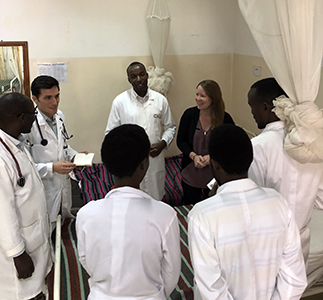
Author: Stacy W. Kish

"I can't really describe it, but I felt like I was entering into a special place," she said.
Stiglmeier arrived at this region of northeastern Arizona to apply her medical skills as a fellow in the Global, Rural and Underserved Child Health (GRUCH) Fellowship program.
The GRUCH Fellowship program at University of Utah Health was designed to train pediatricians to become global health leaders. The participants apply their skills both locally and internationally by caring for children whose health care needs are underserved.
"This is a tough job," said Jeff Robison, MD, director of the GRUCH program and an assistant professor in the Division of Pediatric Emergency Medicine at Primary Children's Hospital. "Our fellows have to operate in difficult clinical environments and be flexible, humble, and innovative."
Every year the program hires two fellows. One provides care at the Chinle Comprehensive Health Center in partnership with Navajo Area Indian Health in Chinle, Ariz. The second provides care at the Butare University Teaching Hospital and the Kabutare District Hospital in Rwanda. After six months, the two fellows switch locations.
While in the field, the fellows face resource limited conditions that produce unique challenges rarely encountered by doctors practicing in more developed settings.

"Working in Rwanda, I can't rely on expensive tests to give me the answers," said Lorin Hall, MD, a current GRUCH fellow.
Hall diagnosed several patients with brucellosis, a bacterial infection transmitted by animal contact and contaminated milk. The diagnosis requires a patient complete several weeks of antibiotics. She based her diagnosis after taking her patient’s history and learning that they often drank unpasteurized milk.
"It made me appreciate the importance of my physical exam skills and taking patient histories," she said.
As the fellows strengthen their bedside care, they must also adjust their approach to meet their patients' needs in culturally diverse settings. Reena Tam, MD, an inaugural fellow and now assistant program director for the GRUCH Fellowship program, tied her success during the program to knowing how to develop trust with her patients.
"Trust is a work in progress," said Tam. "At each location, learning the culture was a priority, and I worked on building trust with each individual patient through understanding."

In addition to caring for their patients, the fellows work to address a need identified by their health care partners at each location. In Chinle, fellows are working on standardizing care for toddlers with respiratory issues. In Rwanda, fellows are focused on lowering the rate of hospital-acquired infections for newborns admitted to the neonatal intensive care unit (NICU).
Hall extended her fellowship into a second year to ensure a project to raise awareness of proper hand hygiene that she developed in Rwanda gains traction. She is motivated by the program's success, seeing NICU infections fall from 11 to 1 percent.
Robison believes fellows are drawn to this work through personal experiences and a desire to make a difference. As the GRUCH fellowship program enters its third year, a new set of fellows will enter the field in July, 2018.
"Visiting family in India, I first witnessed real poverty," said Anik Patel, MD, who will continue the work of current GRUCH fellows Stiglmeier and Hall. "I see my role in serving people through medicine not only as the right thing to do but it is the good thing to do."
Esther Shin, MD, is also excited for the fellowship to begin, but she is aware of the great responsibility ahead of her.
"It is nerve-wracking stepping into these waters," Shin said. She remains focused on honing her skills through the program while helping her patients and giving back to these communities.
Stiglmeier and Hall have a few words of advice for Patel and Shin and all future GRUCH fellows.
"Come into this fellowship with an open heart and an open mind," Stiglmeier said. Hall continues, "Change happens slowly, work with every population as a team and not as an outsider."
Robison believes this program empowers the next generation of future global health leaders while instilling them with skills that are just as applicable to rural American, where health care facilities are few and resources limited.
As the next year of fellows prepares to venture into the field, the GRUCH fellowship program remains committed to working with their health care partners in the Navajo Nation and Rwanda to provide high quality, sustainable care for children.
The GRUCH program selects fellows from a highly competitive pool of applicants from across the country. Inaugural fellows, Tam, Hall, and Stiglmeier received medical degrees from the Ohio State University, University of Tennessee, Health Science Center in Memphis, and St. George's University, Grenada, respectively. Shin and Patel received their medical degrees from Tufts University and University of Missouri, respectively.
The next class of fellows will be selected in November. Learn more about Global Health program at U of U Health.